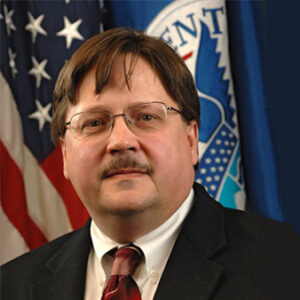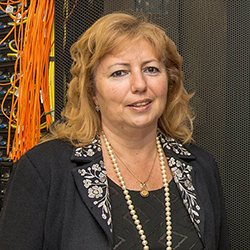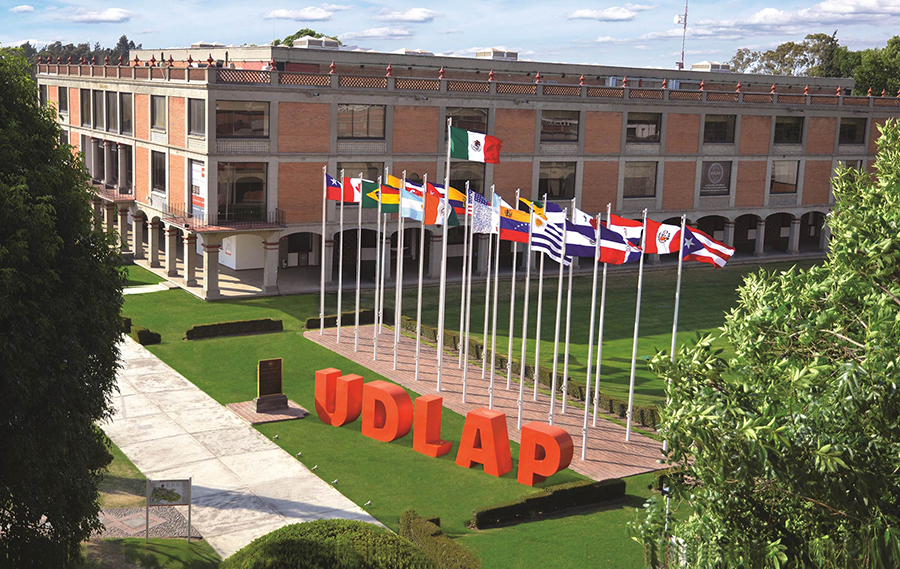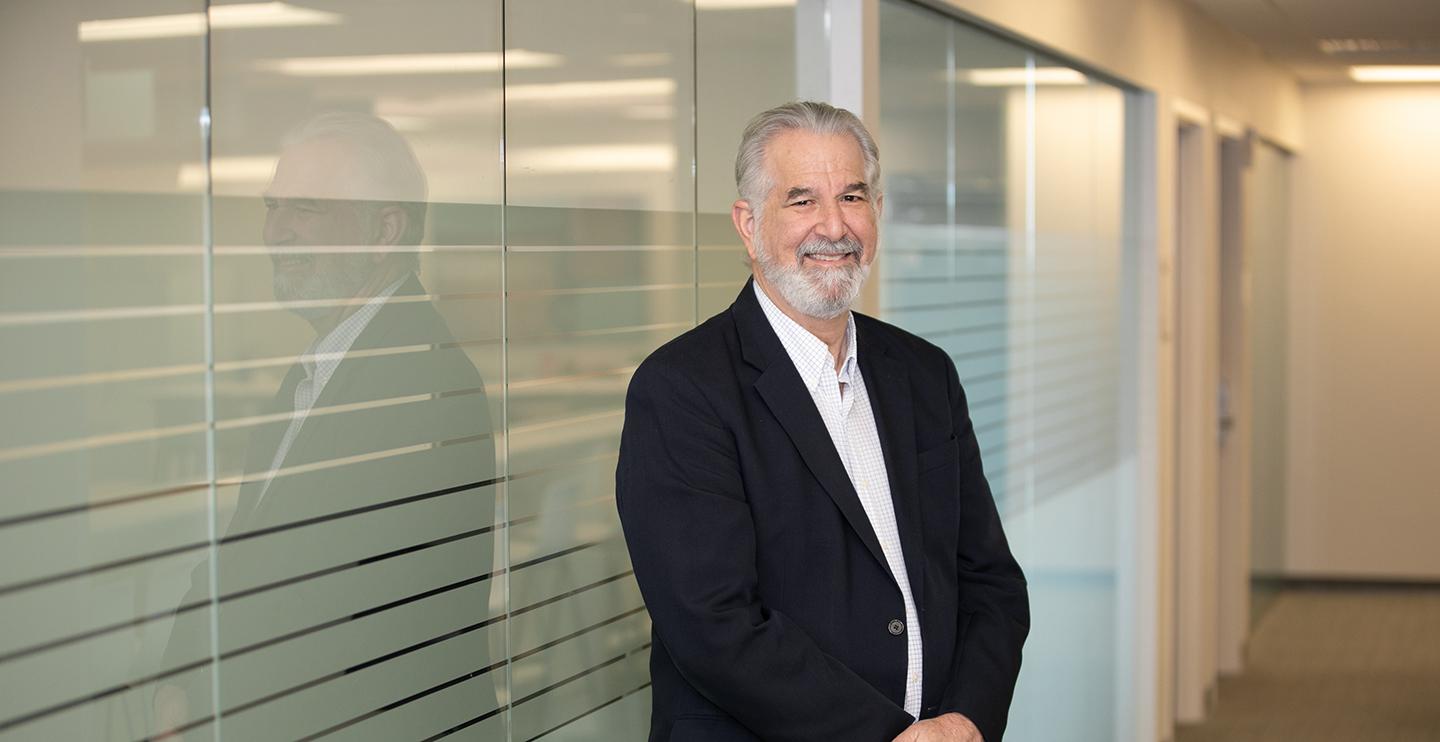Borders between nations don’t exist in the world of cyber crime, so the University of Miami’s Institute for Data Science & Computing (ISDC) is forging a new relationship with a university in Mexico to help both nations bolster their ability to detect, prevent, and respond to cyberattacks.
 Stephen Dennis, a cybersecurity analytics expert and Visiting Fellow at IDSC, traveled to Mexico City in October to participate in the 2022 Cybersecurity and Intelligence Congress at the Jenkins Graduate School of the Universidad de la Américas Puebla (UDLAP). Dennis delivered a keynote speech about the current state of cybersecurity and met with intelligence officials from the Mexican government and military.
Stephen Dennis, a cybersecurity analytics expert and Visiting Fellow at IDSC, traveled to Mexico City in October to participate in the 2022 Cybersecurity and Intelligence Congress at the Jenkins Graduate School of the Universidad de la Américas Puebla (UDLAP). Dennis delivered a keynote speech about the current state of cybersecurity and met with intelligence officials from the Mexican government and military.
“The Mexico agreement will serve as a model for future partnerships with universities.”
The two universities are now crafting an inter-institutional agreement that will allow both sides to share expertise, manpower, and research funding in what Dennis calls a mutually beneficial relationship. In September 2022, hackers infiltrated Mexico’s Defense Ministry and uncovered an estimated six terabytes of sensitive information about the armed forces. But Dennis made clear that the upcoming agreement with UDLAP does not simply mean IDSC is coming to the rescue. “There is no engagement that’s one-sided. We can’t show up and say, ‘Here’s your solution, have a nice day,’” Dennis said. “There’s a lot that Mexico will offer. There’s a lot of diversity that will come to the table from a technical perspective, from a policy perspective, and I think we’re going to learn from each other.”
 Yelena Yesha, Director of IDSC’s AI and Machine Learning Unit, said the Mexico agreement will serve as a model for future partnerships with universities, government agencies, and private industry in other Latin American countries and beyond. Dennis is particularly well-positioned to lead that effort, she said, because of his long career in advanced computing and automation, most recently leading technology collaborations across governmental agencies that require robust cybersecurity technologies for thousands of users. For example, he recently concluded a stint as Technology Center Director for Advanced Computing at the U.S. Department of Homeland Security, which has over 240,000 employees.
Yelena Yesha, Director of IDSC’s AI and Machine Learning Unit, said the Mexico agreement will serve as a model for future partnerships with universities, government agencies, and private industry in other Latin American countries and beyond. Dennis is particularly well-positioned to lead that effort, she said, because of his long career in advanced computing and automation, most recently leading technology collaborations across governmental agencies that require robust cybersecurity technologies for thousands of users. For example, he recently concluded a stint as Technology Center Director for Advanced Computing at the U.S. Department of Homeland Security, which has over 240,000 employees.
“As we build the cybersecurity analytics capabilities at the University of Miami, we are looking forward to Stephen’s leadership in coalescing critical research topics and attracting appropriate resources to accelerate our impact to global cybersecurity,” Yesha said.
“One of the key components will be preventing hackers from sabotaging physical infrastructure.”
Dennis said one of the key components of the U.S.-Mexico partnership will be cyber-physical security, the ever-growing field of preventing hackers from sabotaging physical infrastructure like power stations, water plants, transportation systems, telecommunications networks, and other critical systems. With both countries sharing so much of that infrastructure, Dennis said securing Mexico’s systems will help protect the U.S., and vice versa.
Improving Health Disparities
The agreement between IDSC and UDLAP has a second focus: using advanced computing to improve health disparities that exist in both countries. While that may not appear to overlap with cybersecurity, Dennis said securing people’s personal health information will become increasingly important in the years to come. As people become more accustomed to telehealth and companies produce more internet-connected devices that track people’s health, Dennis said securing all that information presents a monumental challenge. That challenge was made clear during the hack of Mexico’s Defense Ministry—hackers also uncovered details of President Andrés Manuel López Obrador’s ongoing heart problems.

Dennis said he’s looking forward to returning to Mexico City to finalize the agreement with IDSC and get to work. He said his Mexican colleagues are “primed and poised” to start working. He’s already thinking of other universities and private companies that can help. The only roadblock remaining? His Spanish. Dennis wants to create training seminars for English-speaking researchers who will participate with the Mexicans, and English classes for his Mexican colleagues, focusing on the wide variety of technical terms that both sides will need to understand.
“If we’re going to be cross-border, working on common infrastructure, it’d be really nice to have a common language,” he said.
Story by Alan R. Gomez
HEADER PHOTO: Dr. Stephen Dennis (far right), a visiting fellow at the University of Miami’s Institute for Data Science & Computing (IDSC), meets in Mexico City with representatives of the Jenkins Graduate School of the University of the Americas Puebla (UDLAP), the Mexican Navy, and the United Nations Office on Drugs and Crime in Mexico, to discuss a new cybersecurity research partnership between UDLAP and IDSC.
Tags: Cyber Crime, cybersecurity, Cybersecurity and Intelligence Congress, Jenkins Graduate School, Mexico, Stephen Dennis, Telehealth, UDLAP, Universidad de las Americas Puebla, yber-physical security


